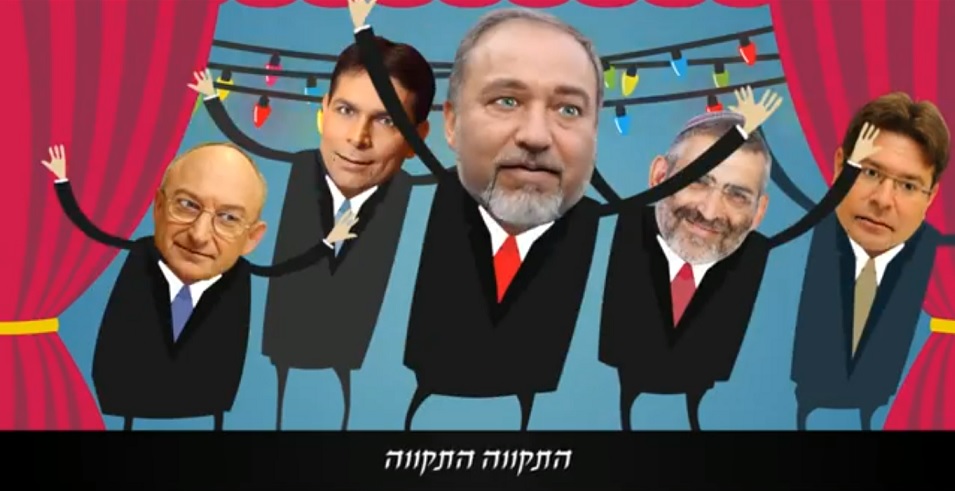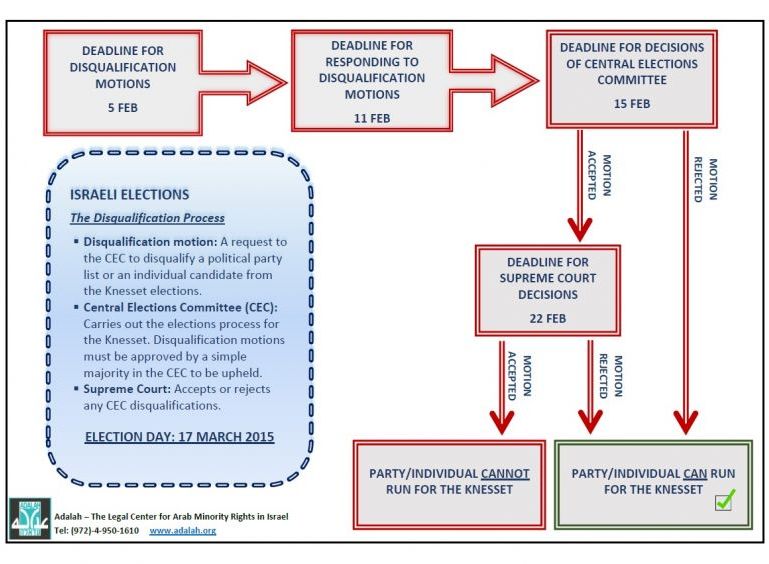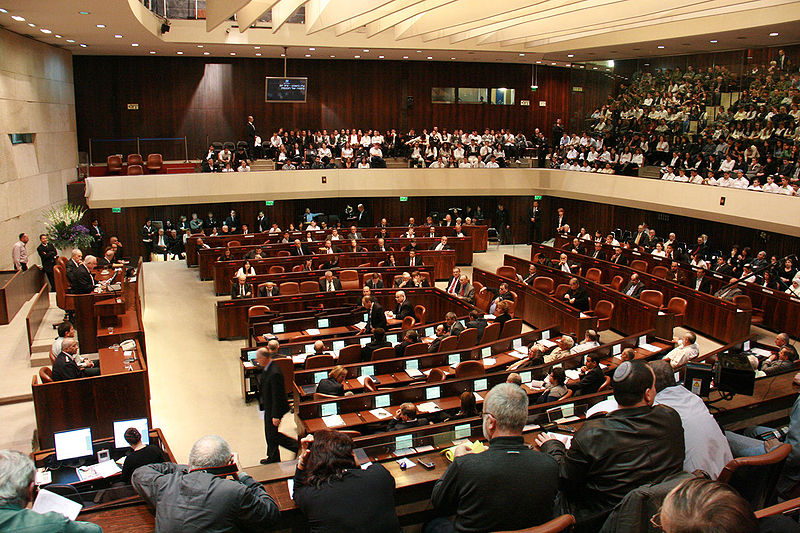Elections Q&A: What you need to know about 2022 Israeli elections and Arab parliamentarians
When and for what purpose is Israel holding elections?
Israel will hold parliamentary (Knesset) elections on 1 November 2022. The elections will determine the composition of the 25th Knesset, which has 120 seats, as well as the prime minister. The 2022 elections mark the 5th round of elections in Israel since 2019.
Who can vote?
Israeli citizens aged 18 years and over have the right to vote, including Palestinian citizens of Israel, who make up about 1.6 million people or 20 percent of the state’s population. According to the Israel Democracy Institute, in the last elections for the 24th Knesset (2021-2022), the voter turnout was approximately 67.4% overall and about 44.6% among Palestinian citizens of Israel (marking a sharp decline from the 2020 elections, when this figure stood at 64.8%).
Which Jewish Israeli political parties are running in the election?
40 candidates' lists in total have entered the race for the Knesset. Based on recent polls, it is likely that 11 of these lists will pass the electoral threshold (3.25% of the vote) and win seats.
The Israeli Zionist parties fall into four general categories: the right wing; the religious; the center; and the left. The right-wing camp includes Likud, led by former Prime Minister Benjamin Netanyahu; National Unity led by Benny Gantz; Yisrael Beiteinu, led by former Defense Minister Avigdor Lieberman; a slate comprised of the Religious Zionist Party led by MK Bezalel Smotrich and the Kahanist Jewish Power (Otzma Yehudit) led by Itamar Ben-Gvir. The religious camp includes parties such as Shas and United Torah Judaism. The centrist parties include Yesh Atid, led by Prime Minister Yair Lapid, and Labor, led by Transportation Minister Merav Michaeli. The left camp includes Meretz, led by Zehava Gal-On.
Which Arab-led political parties are running in the elections?
There are four Arab-led parties participating in the 2022 elections.
The Hadash-Ta’al list is comprised of two parties, the Democratic Front for Peace and Equality(Hadash/Jabha) party, led by MK Ayman Odeh, and the Arab Movement for Renewal (Ta'al), led by MK Dr. Ahmed Tibi. In the outgoing Knesset, both of these parties and Balad/Tajammu’ were under one slate – The Joint List; it held 6 seats.
Balad/Tajammu’: The third party is the National Democratic Assembly (Balad/Tajammu'), led by MK Dr. Sami Abu Shehadeh.
Ra’am: The fourth party is the United Arab List (Ra'am), led by Dr. Mansour Abbas. In the outgoing Knesset, Ra’am held 4 seats, and it was part of the governmental coalition.
.
Is fair representation for Palestinian citizens of Israel guaranteed in the Knesset?
No. No seats are designated for Arab political party lists or candidates, and there is no quota system to ensure that Palestinian citizens of Israel are appropriately represented in the parliament.
What is a disqualification motion and who can file it?
A disqualification motion is a request filed to the Knesset's Central Elections Committee (CEC) to disqualify a political party list or an individual candidate from the elections. A simple majority of 51% percent of CEC members is required to approve the motion. The attorney general, a political party, or any citizen aged 18 years and over can file a disqualification motion to the CEC.
What law governs the disqualification process?
The Knesset Elections Law (Consolidated Version) – 1969 governs the process of filing, deciding on, and appealing against decisions on motions for disqualification. Article 7A of the Basic Law: The Knesset – 1985 (and subsequent amendments) enumerates the grounds on which a party or individual candidate can be disqualified from the elections.
Article 7A of the Basic Law: The Knesset, entitled "Prevention of participation in the elections", provides that a candidate or a political party list may be disqualified from Knesset elections if their goals or actions, including speech: (i) deny the existence of the State of Israel as a Jewish and democratic state; (ii) incite to racism; or (iii) [offer] support of armed struggle to an enemy state or to a terrorist organization against the State of Israel. Read the Basic Law: The Knesset, here.
The vaguely-worded provisions of Article 7A are dangerous as they could be used to ban a party that adopts political positions like supporting a one-state solution, or a "state for all its citizens", on the basis that they constitute some form of denial of the nature of the Jewish state. Further, the law does not define a "terror organization" or what acts would constitute offering "support" for an armed struggle.
What is the Central Elections Committee (CEC)?
The Knesset Elections Law (Consolidated Version) - 1969 establishes the Central Elections Committee (Va'adet HaBehirot HaMerkazit) in order to carry out the elections process for the upcoming Knesset. The CEC is a politicized body comprised of 30 outgoing members of Knesset and is chaired by a Supreme Court justice. Justice Yitzhak Amit is the chairperson of the CEC for the elections for the 25th Knesset.
The functions of the CEC include: receiving the lists of candidates and party platforms and approving them; other technical duties related to facilitating the voting; training elections staff; collecting the elections results from each polling station; and tallying and publishing the elections results, among others. The CEC also holds hearings and decides on motions to disqualify political party lists and individual candidates from running in the elections.
Is there an appeal process to challenge the CEC's decisions?
If the CEC votes to disqualify an individual candidate, it must forward its decision and arguments to the Supreme Court for approval. If the CEC decides to disqualify a political party list, the list has the right to appeal to the Supreme Court under Article 64 of the Knesset Elections Law (1969). The Supreme Court has previously overturned CEC decisions to disqualify Arab political party lists and candidates.
In the 1980s, the CEC also barred radical radical right-wing candidates, including former MK Meir Kahane and his Kach party from the Knesset for racism, and this decision was affirmed by the Supreme Court. Kahane and Kach engaged in violent activities, advocated for legislation to forbid sexual relations between non-Jews and Jews, to separate Jewish and Arab neighborhoods, and to prohibit meetings of any sort between young Jews and Arabs.
Have disqualification motions been filed against Arab parties or candidates for the 2022 elections?
Yes – four (4) disqualification motions have been filed against Arab parties and candidates in 2022.
Motions have been filed against:
Balad/Tajammu': one by the ‘Anachnu’ (We) party led by Mosh Huga, and another by the ‘Me and You - The Israeli People's Party’ led by Dr. Alon Giladi. The latter motion was deleted on 28 September 2022.
Ra’am: two motions were filed by right-wing, Israeli organizations – ‘Choosing Life - Bereaved Families Against Terrorists’ and ‘Ad Kan’.
Have there been previous disqualification motions against Arab political parties and candidates?
Yes – in every election cycle for the past 20+ years. Examples include the following cases:
In December 2002, the attorney general asked to disqualify and the CEC voted to disqualify the Balad/Tajammu' party and MK Azmi Bishara specifically from the 2003 Knesset elections, arguing that they "deny the existence of the State of Israel as a Jewish and democratic state," and "support an armed struggle of an enemy state or terrorist organization against the State of Israel." Following Adalah's petition, the Supreme Court cancelled the CEC's decision in a 7-4 decision, and reinstated both Balad/Tajammu' and MK Bishara for candidacy in the elections.
In the 2013 elections, right-wing MKs asked the CEC to disqualify Arab parties Balad/Tajammu' and Ra'am-Ta'al, as well as MK Zoabi as an individual candidate, from the elections. MK Zoabi's disqualification was approved by the CEC, but overturned unanimously by the Supreme Court.
Ahead of the 2015 elections, the CEC approved (by 27 votes to 6) disqualification motions that were filed by Likud and Yisrael Beiteinu against MK Haneen Zoabi (Balad/Tajammu'), claiming that she "supports the armed struggle of terrorist organizations". The CEC's decision contradicted the position of the Attorney General, who opposed MK Zoabi's disqualification. The Supreme Court overturned the CEC's decision in an 8-1 ruling.
In the 2020 Election to the 23rd Knesset, disqualification motions were filed by the Likud party, Yisrael Beiteinu faction, the Jewish Power party and others against MK Heba Yazbak (Joint List), arguing that she “denies the existence of the State of Israel as a Jewish and democratic state," and "supports an armed struggle of terrorist organizations.” The CEC approved the requests. Following Adalah’s petition, the Supreme Court overturned the CEC’s decision in a close 5-4 ruling.
Are there other methods to exclude Arab parties and representatives from political participation?
Yes. For example, the "Expulsion Law", enacted in 2016, allows a majority of 90 Knesset members to oust a serving Knesset member on two grounds: 1) incitement to racism; and 2) support for armed struggle against Israel. The law was passed as an amendment to the Basic Law: The Knesset, specifically to target Arab MKs, due to their vocal opposition to Israeli government's policies. In May 2018, the Supreme Court rejected a petition filed against the law by Adalah, the Association for Civil Rights in Israel (ACRI), and MK Yousef Jabareen.
Other methods have also been used in recent years to restrict Arab MKs' political activities in a discriminatory manner.
In March 2018, the Knesset Ethics Committee barred MK Yousef Jabareen from participating in lectures in the United States sponsored by Jewish Voice for Peace (JVP), based on a new amendment to the Knesset's Code of Ethics that gives the committee the power to forbid an MK from traveling overseas if funding for the trip is provided by a body that knowingly publishes a call to boycott the State of Israel or participates in such a boycott. A petition filed by Adalah and MK Jabareen to cancel the committee's decision was rejected by the Supreme Court on 22 June 2021.
The Ethics Committee has also used its authority on several occasions to suspend Arab Knesset members from parliamentary meetings due to their political speech. For example, in 2014, the Supreme Court rejected a petition submitted by Adalah and ACRI on behalf of Arab MK Haneen Zoabi (Balad/ Tajammu') against the Committee's decision to suspend MK Zoabi from all parliamentary meetings for six months, based on statements that she made during the Israeli military's "Operation Brother's Keeper" in the occupied West Bank.
In June 2018, the Knesset Presidium refused to allow the submission of a bill proposed by MKs from Balad/Tajammu', which would declare Israel a "state of all its citizens", based on the claim that Israel is a Jewish state. The bill was initiated in response to the advancement of the Jewish Nation-State Law, which was passed by the Knesset in July 2018. In December 2018, the Supreme Court dismissed a petition filed by Adalah on behalf of the Balad/Tajammu' to cancel the Presidium's decision; in doing so, the Court refused to even allow a discussion of equal rights and a state for all its citizens in the Knesset.
Important dates regarding disqualification motions
- 22 September: Deadline for submitting disqualification motions to CEC.
- 28 September: Deadline for submitting responses to disqualification motions.
- 28 September: Deadline for the attorney general to submit her position on the motions.
- 29 September: Hearings in the CEC on the disqualification motions
- 2 October: Deadline for the CEC to decide on disqualification motions.
- 4 October: Deadline to appeal to the Supreme Court on CEC decisions.
- 9 October: Deadline for Supreme Court rulings in appeals on CEC decisions.
Historical background on Palestinian participation in Knesset elections
Palestinian citizens of Israel have run in every election and been elected to every Knesset since the first Knesset elections in 1949. One Arab party, the Democratic List of Nazareth, won enough seats to cross the basic threshold in 1949, taking two seats. Until the 1960s, all Arab parties in the Knesset were affiliated with Mapai, the ruling party, a forerunner of the Labor party, which did not accept Arab members itself.
In 1965, an independent Arab list attempted to run for Knesset elections, with the Al-Ard movement forming the United Arab List. However, the Supreme Court banned the list in the Yardor case on the ground that it "den[ied] the integrity of the State of Israel and its very existence." This decision was arbitrary as it was not based on any evidence or any law; it predated the enactment of Article 7A of the Basic Law: The Knesset.



















